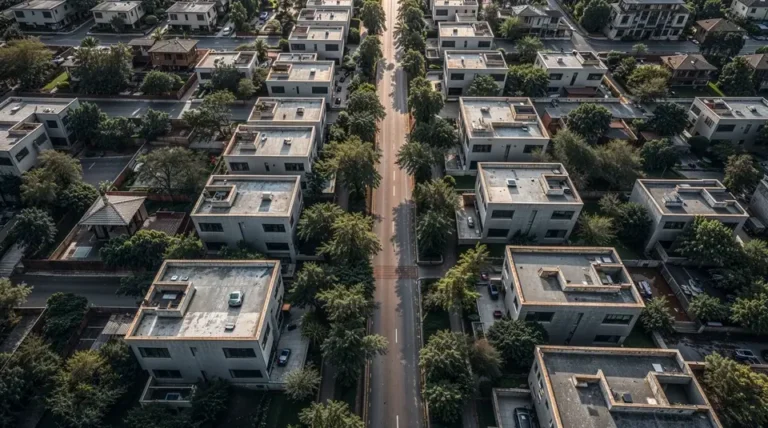Pakistan real estate sector holds immense potential to drive economic growth and transform the country’s urban landscape. With a market value estimated at around $1.8 trillion, the sector is poised for a dramatic expansion in 2024, driven by a sharp rise in demand for residential properties1. Market volume is expected to hit $1.49 trillion, boosting economic recovery, urbanization, and infrastructure development. With favorable government policies, the sector could reach a total value of $2.11 trillion, presenting lucrative opportunities for investors2. This potential, however, can only be fully realized if the government takes proactive steps to address the challenges and leverage the opportunities within this dynamic sector. This blog post delves deep into the intricacies of Pakistan’s real estate industry, exploring its current state, challenges, and potential, while drawing valuable lessons from other developing countries that have successfully harnessed the power of real estate to transform their economies.
The Current Landscape of Pakistan Real Estate Sector
The real estate industry in Pakistan is a significant contributor to the national economy, accounting for approximately 2.8% of the GDP in FY233. The sector encompasses a wide range of activities, including the development, sale, and management of residential, commercial, and industrial properties4. The industry is characterized by a diverse mix of players, ranging from small-scale developers and individual investors to large corporations and real estate investment trusts (REITs)3. Furthermore, the construction sector, closely linked to real estate, contributes over 2.5% to the GDP and has connections to over 200 industries5.
| Feature | Description |
|---|---|
| Market Size | Worth around $1.8 trillion, with the potential to reach $2.11 trillion1. |
| Growth Rate | The population has grown at a CAGR of 2.1% between FY16 and FY21, with the real estate industry contributing significantly to Pakistan’s GDP with a growth rate of between 5.4% and 5.9% during the same period1. |
| GDP Contribution | The real estate sector contributed ~2.8% to the national GDP in FY233. |
| Construction Sector Contribution | The construction sector contributes over 2.5% to the GDP and is linked to over 200 industries5. |
| Investment Trends | Increasing demand for affordable housing, growing interest from international investors, popularity of gated communities, and technological advancements6. Infrastructure development, such as the Lahore Ring Road and CPEC, is also attracting investment8. |
| Challenges | Regulatory hurdles, market volatility, lack of affordable housing, and environmental concerns9. |
| Property Values | Property values have declined by 15% in the last year, a rate faster than that seen in other Asian cities. Karachi has seen a 4% decrease in property values over the past decade, while Mumbai experienced an 8% increase5. |
| Rental Yields | Moderate rental yields of 5-6% and approximately 6% in transaction costs5. |
| Mortgage-to-GDP Ratio | Pakistan has a low mortgage-to-GDP ratio, indicating underdevelopment in the sector and a missed opportunity in fostering economic growth and affordable housing5. |
According to market trend strategist and analyst Usman Suhail, “Owing to economic recovery, favorable government policies, and incentives, Pakistan’s real estate market is poised to reach historic highs.” 2
Affordable Housing: A Critical Need
One of the most pressing challenges facing Pakistan’s real estate sector is the lack of affordable housing. Despite the growing demand, a significant shortage of affordable housing units persists, particularly for low-income households9. This shortage has profound social and economic consequences. It can lead to social unrest, exacerbate poverty, and hinder economic progress by limiting access to safe and stable housing for a significant portion of the population.
Addressing this challenge requires a multi-pronged approach. The government should prioritize increasing the supply of affordable housing units through public-private partnerships and targeted subsidies10. Tax incentives and financial assistance can be offered to developers focused on affordable housing projects. Innovative financing models, such as micro-mortgages and rent-to-own schemes, can also make housing accessible to low-income households11.
Government Policies and Initiatives: A Critical Review
The government of Pakistan has recognized the importance of the real estate sector and has implemented various policies and initiatives aimed at regulating and developing the industry. These efforts include:
Tax Reforms:
The government has introduced Capital Gains Tax (CGT) and property tax reforms to increase revenue collection and promote transparency in the real estate market12. While these reforms have faced some initial challenges, they are crucial for formalizing the sector and ensuring sustainable growth.
Housing Schemes:
Initiatives like the Naya Pakistan Housing Scheme aim to provide affordable housing options and stimulate the construction sector10. This scheme has the potential to address the housing shortage and create employment opportunities, but its success hinges on effective implementation and collaboration with private sector developers.
Foreign Investment Incentives:
Programs like the Roshan Apna Ghar Initiative encourage overseas Pakistanis to invest in real estate through remittances10. This initiative has attracted significant investment and provided a much-needed influx of foreign currency, but further efforts are needed to streamline investment procedures and ensure the security of investments.
Regulatory Bodies:
The establishment of Real Estate Regulatory Authorities (RERAs) at the provincial level is a positive step towards protecting consumer interests and promoting ethical practices13. However, the effectiveness of these regulations depends largely on their implementation and enforcement, which requires strengthening the capacity of RERAs and ensuring their independence.
Promoting Housing and Construction Financing:
The government and the State Bank of Pakistan (SBP) have taken measures to promote housing and construction financing, including offering subsidized loans and relaxing lending criteria14. These measures have contributed to the growth of the housing sector, but further efforts are needed to ensure access to financing for low-income households.
Response to COVID-19:
During the COVID-19 pandemic, the government took proactive steps to support the real estate market. These included tax incentives for the construction sector, a subsidy of 30 billion Rupees for its development, and the continuation of activities in the real estate market to provide employment opportunities15. These measures helped mitigate the negative impact of the pandemic on the sector and demonstrated the government’s commitment to its growth.
Real Estate Investment Trusts (REITs):
The government is promoting the development of REITs in Pakistan to aid in the formalization of the real estate sector16. REITs can provide a transparent and regulated platform for investment in real estate, attracting both domestic and foreign capital.
World Bank Interventions:
The World Bank is actively involved in supporting Pakistan’s land and housing sectors through various projects. These include the Punjab Urban Land Systems Enhancement (PULSE) project, which supports the digitization of land records and property mapping, and the Pakistan Housing Finance Project (PHFP), which promotes access to mortgage loans for low-income households11. These interventions are crucial for improving land administration, promoting affordable housing, and strengthening the overall real estate market.
While these initiatives have had some positive impact, their effectiveness has been limited by implementation challenges and a lack of comprehensive planning13. A more robust and effectively implemented regulatory framework is needed to ensure transparency, protect investors, and promote sustainable development in the real estate sector.
Learning from Success Stories: Case Studies of Developing Countries
Several developing countries have successfully leveraged their real estate markets to drive economic growth and improve living standards. Here are a few notable examples:
Singapore:
- Public Housing Programs: Singapore’s Housing and Development Board (HDB) has played a crucial role in providing affordable housing to the majority of its citizens, contributing to social stability and economic growth17. By ensuring access to quality housing, Singapore has created a stable and productive workforce, attracting investment and fostering economic development.
- Strategic Urban Planning: The Urban Redevelopment Authority (URA) has implemented comprehensive urban planning strategies, ensuring sustainable development and efficient land use17. This has helped create a livable and attractive urban environment, further boosting the real estate market and attracting foreign investment.
- Investment-Friendly Policies: Singapore has created a favorable investment climate, attracting foreign capital and expertise to its real estate sector18. This has led to the development of innovative and high-quality real estate projects, further strengthening the sector’s contribution to the economy.
China:
- Infrastructure Development: Massive investments in infrastructure, including transportation networks and urban development projects, have fueled the growth of China’s real estate sector19. By improving connectivity and creating new urban centers, China has stimulated demand for real estate and attracted significant investment.
- Land Sale Revenues: Local governments have generated significant revenue from land sales to developers, financing infrastructure projects and stimulating economic activity19. This has created a virtuous cycle of development, with real estate growth contributing to infrastructure development and vice versa.
- Urbanization and Industrialization: Rapid urbanization and industrialization have created a massive demand for housing and commercial properties, driving the expansion of the real estate market20. This highlights the importance of aligning real estate development with broader economic trends and demographic shifts.
Dubai:
- Luxury Developments: Dubai has focused on developing iconic luxury properties, attracting high-net-worth individuals and investors from around the world21. This has positioned Dubai as a global real estate hub, generating significant revenue and creating a thriving luxury property market.
- Tourism and Hospitality: The real estate sector has played a key role in supporting Dubai’s booming tourism and hospitality industry, creating jobs and generating revenue21. By providing world-class accommodation and entertainment facilities, Dubai has attracted tourists and investors, further boosting its economy.
- Foreign Investment: Dubai has actively courted foreign investment in its real estate sector, contributing to its rapid growth and development21. This has created a diverse and dynamic real estate market, with a wide range of investment opportunities.
These case studies highlight the importance of strategic planning, government support, and a focus on key areas like affordable housing, infrastructure development, and foreign investment in unlocking the full potential of the real estate sector.
The Role of Technology and Innovation
Technology is playing an increasingly important role in the Pakistani real estate sector. Online property portals, virtual tours, and digital payment systems are transforming the way real estate transactions are conducted16. The emergence of PropTech solutions is improving efficiency and transparency in the market, making it easier for buyers, sellers, and investors to connect and conduct transactions.
The development of smart cities is another key trend, with technology being integrated into urban planning and building design16. This includes the use of sensors, data analytics, and automation to improve energy efficiency, security, and overall livability in urban areas.
The government should actively encourage the adoption of technology in the real estate sector by supporting the development of PropTech solutions, promoting research and development in sustainable building materials and construction technologies, and incorporating technology into its urban planning initiatives.
A Roadmap for Pakistan Real Estate: Policy Recommendations
To fully capitalize on the potential of its real estate sector, the government of Pakistan should consider the following policy recommendations:
1. Streamline Regulatory Processes:
- Simplify property laws and regulations to reduce bureaucratic hurdles and promote transparency.
- Establish a centralized property registry to ensure secure and efficient property transactions.
- Implement effective mechanisms for resolving land disputes and preventing property fraud.
2. Promote Affordable Housing:
- Increase the supply of affordable housing units through public-private partnerships and targeted subsidies.
- Offer tax incentives and financial assistance to developers focused on affordable housing projects.
- Implement innovative financing models, such as micro-mortgages and rent-to-own schemes, to make housing accessible to low-income households.
3. Encourage Sustainable Development:
- Incorporate environmental considerations into urban planning and building regulations.
- Promote the use of green building materials and technologies to reduce the environmental impact of construction.
- Develop sustainable infrastructure, such as efficient transportation systems and renewable energy sources, to support the growth of the real estate sector.
4. Attract Foreign Investment:
- Create a more investor-friendly environment by offering tax breaks, simplifying investment procedures, and ensuring the security of investments.
- Promote Pakistan’s real estate sector at international forums and attract foreign capital and expertise.
- Develop partnerships with international real estate companies to bring best practices and innovation to the Pakistani market.
5. Enhance Transparency and Accountability:
- Strengthen the capacity of RERAs to effectively regulate the real estate market and protect consumer interests.
- Implement measures to prevent corruption and ensure transparency in property transactions.
- Promote ethical practices and accountability within the real estate industry.
6. Foster Innovation and Technology Adoption:
- Encourage the use of technology in real estate transactions, such as online property portals, virtual tours, and digital payment systems.
- Support the development of PropTech solutions to improve efficiency and transparency in the real estate sector.
- Promote research and development in sustainable building materials and construction technologies.
7. Focus on Emerging Cities:
- Promote investment in emerging cities like Gwadar, Faisalabad, and Multan, highlighting their diverse opportunities in residential, commercial, and business properties16. These cities offer significant potential for growth and can contribute to a more balanced and inclusive development of the real estate sector.
8. Diversify Investment Portfolios:
- Encourage investors to diversify their portfolios across different segments of the real estate market, such as residential, commercial, and industrial properties16. This can help optimize returns by capitalizing on various market needs and trends.
By implementing these recommendations, the government of Pakistan can create a thriving real estate sector that contributes significantly to economic growth, job creation, and improved living standards for its citizens.
Conclusion
Pakistan’s real estate sector is at a pivotal point. The sector has demonstrated resilience and growth in recent years, with a market value estimated at $1.8 trillion and the potential to reach $2.11 trillion1. This growth is driven by factors such as increasing demand for affordable housing, rising foreign investment, and infrastructure development. However, challenges such as regulatory hurdles, market volatility, and a lack of affordable housing need to be addressed to unlock the sector’s full potential.
The government has implemented various policies and initiatives to support the real estate sector, including tax reforms, housing schemes, and the establishment of regulatory bodies. However, a more comprehensive and effectively implemented regulatory framework is needed to ensure transparency, protect investors, and promote sustainable development.
Learning from the success stories of other developing countries like Singapore, China, and Dubai, Pakistan can leverage its real estate sector to drive economic growth and improve living standards. By streamlining regulatory processes, promoting affordable housing, encouraging sustainable development, attracting foreign investment, and fostering innovation and technology adoption, Pakistan can create a thriving real estate market that benefits all its citizens.
References
1. Real estate in Pakistan – Wikipedia, accessed on December 16, 2024, https://en.wikipedia.org/wiki/Real_estate_in_Pakistan
2. Real estate potential stands at $2.11tr – The Express Tribune, accessed on December 16, 2024, https://tribune.com.pk/story/2497796/real-estate-potential-stands-at-211tr
3. Real Estate – Pacra.com, accessed on December 16, 2024, https://www.pacra.com/view/storage/app/Real%20Estate%20-%20PACRA%20Research%20-%20Jun%2724_1718109556.pdf
4. An Analysis of the Real Estate Brokerage Market in Pakistan, accessed on December 16, 2024, https://file.pide.org.pk/uploads/wp-0216-an-analysis-of-the-real-estate-brokerage-market-in-pakistan.pdf
5. Challenges and opportunities in Pakistan’s real estate Sector – Business Recorder, accessed on December 16, 2024, https://www.brecorder.com/news/40291338
6. Current Situation of the Real Estate Market in Pakistan 2024, accessed on December 16, 2024, https://timesquaremarketing.com/current-situation-of-the-real-estate-market-in-pakistan-2024/
7. Investing in Pakistan’s Real Estate Boom: Your 2024 Investor’s Success Guide – Aeon & Trisl, accessed on December 16, 2024, https://aeontrisl.pk/guide-to-investing-in-pakistan-real-estate/
8. Real Estate Investment Climate In Pakistan: Navigation Guide, accessed on December 16, 2024, https://elanrealestate.pk/investment/real-estate-investment-climate-in-pakistan/
9. What is the Future of Real Estate in Pakistan? | %sitename – RealtorOnline, accessed on December 16, 2024, https://realtoronline.pk/what-is-the-future-of-real-estate-in-pakistan/
10. Impact of Government Policies on Pakistan’s Real Estate Market | Decade Review, accessed on December 16, 2024, https://redbox.estate/blog/the-impact-of-government-policies-on-pakistans-real-estate-market-a-decade-in-review
11. Managing supply and demand: The key to getting ‘housing’ right in Pakistan, accessed on December 16, 2024, https://blogs.worldbank.org/en/endpovertyinsouthasia/managing-supply-and-demand-key-getting-housing-right-pakistan
12. Government Policies in Real Estate in Pakistan – Nexus Ideas, accessed on December 16, 2024, https://nexusideaspk.com/government-policies-in-real-estate-in-pakistan/
13. The Impact Of Government Policies On Lahore’s Real Estate Market, accessed on December 16, 2024, https://www.dailyparliamenttimes.com/2024/08/22/the-impact-of-government-policies-on-lahores-real-estate-market/
14. PAKISTAN ECONOMIC SURVEY 2021-22 REAL ESTATE HIGHLIGHTS – NAPHDA, accessed on December 16, 2024, https://naphda.gov.pk/naphda.gov.pk/docs/Economy%20Survey%20-%20Real%20Estate%20Highlights.pdf
15. Exploring the Ongoing Situation of Real Estate Market in Pakistan: Here’s What You Need to Know – Zen Retreats, accessed on December 16, 2024, https://zenapartments.com.pk/exploring-the-ongoing-situation-of-real-estate-market-in-pakistan/
16. Real Estate Business in Pakistan: Trends & Industry Insights – Union Developers, accessed on December 16, 2024, https://www.uniondevelopers.com/blog/real-estate-business-in-pakistan/
17. The History of Growth in Singapore’s Real Estate Market – Insights by PropertyLimBrothers, accessed on December 16, 2024, https://plbinsights.com/history-growth-singapore-real-estate-market/
18. III Singapore’s Development Strategy in – IMF eLibrary, accessed on December 16, 2024, https://www.elibrary.imf.org/view/book/9781557754639/ch003.xml
19. The boom, bust and future of China’s real estate sector – Bruegel, accessed on December 16, 2024, https://www.bruegel.org/newsletter/boom-bust-and-future-chinas-real-estate-sector
20. Derisking Real Estate in China’s Hybrid Economy – Wei Xiong, accessed on December 16, 2024, https://wxiong.mycpanel.princeton.edu/papers/Real%20Estate%20Chapter.pdf
21. Economy of the United Arab Emirates – Wikipedia, accessed on December 16, 2024, https://en.wikipedia.org/wiki/Real_estate_in_the_United_Arab_Emirates








One Response